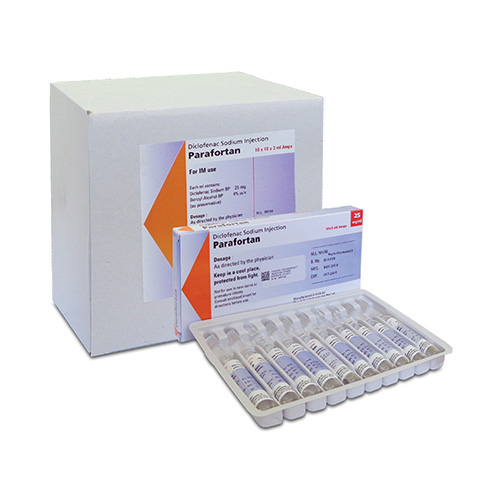
PARAFORTAN Inj
Therapeutic Class
Nonsteroidal Anti-Inflammatory Drugs (NSAIDs)
Indications
Diclofenac Sodium Injection is indicated for the relief of pain and inflammation associated with Rheumatoid arthritis, osteoarthritis, ankylosing spondylitis. Low back pain and other acute musculoskeletal disorders such as periarthritis, tendinitis, tenosynovitis, bursitis, sprains, strains and dislocations. Orthopedic, dental and other minor surgeries, post traumatic and post operative pain, acute gout, renal & biliary colic, dysmenorrhoea.
Chemical Composition
Each ml contains:
Diclofenac Sodium BP........... 25mg
Benzyl Alcohol BP.................... 4% w/v
Water for injections BP ...........qs
Packaging
10 x 3 ml / Box
Dosage & Administration
Intramuscular doses of 75 milligrams twice a day have been studied for use in postoperative pain. Diclofenac 1 milligram/kilogram was administered via intravenous push or a slow intravenous infusion. No specific dosage adjustment for diclofenac is necessary in renal impairment, but a closer monitoring of patients is recommended in significantly impaired renal function. Dosage adjustments are not necessary in patients with mild hepatic insufficiency.
Contraindications
« Hypersensitivity to diclofenac and diclofenac-containing products « Rhinitis, urticaria, asthma, or allergic reactions to aspirin or other anti-inflammatory agents
Warning & Precautions
Previous history of gastrointestinal ulceration, bleeding, or perforation. Renal dysfunction. Hypertension or cardiac conditions aggravated by fluid retention and edema. History of liver dysfunction. Pre-existing infection. Pre-existing asthma. Hepatic porphyria. History of coagulation defects. Late pregnancy. Influenza-related encephalitis/encephalopathy. Ophthalmologic examination is required in patients with visual changes during therapy.
Drug Interaction
NSAIDs may decrease the antihypertensive and natriuretic effect of ACE inhibitors, particularly in low renin hypertensive patients. The combination of NSAIDs and ACE inhibitors can produce side effects such as marked bradycardia due to hyperkalemia. This can further lead to syncope in which the peaked T wave is induced. Aged patients suffering from hypertension, diabetes mellitus, ischemic heart disease, and degenerative joint disease must be careful when taking these medications in combination. Concomitant administration of aspirin and diclofenac results in aspirin displacing diclofenac from its binding sites. This leads to reduced diclofenac plasma concentrations, peak plasma levels, and area under the concentration-time curve (AUC) values. The concurrent use of nonsteroidal anti-inflammatory drugs (NSAIDs) and beta-adrenergic blockers has been reported to result in increase in blood pressure and interference with blood pressure control. Increased digoxin serum concentrations have been reported during concurrent therapy with digoxin and diclofenac. Patients on concomitant treatment should be closely followed for digoxin toxicity. Ketorolac is contraindicated in patients currently receiving aspirin or NSAIDs because of the cumulative risks of inducing serious NSAID-related adverse events (peptic ulcers, gastrointestinal bleeding and/or perforation).The concurrent administration of ofloxacin, a quinolone antibiotic, and a non-steroidal anti-inflammatory drug (NSAID) may increase the risk of central nervous system stimulation and convulsive seizures.

